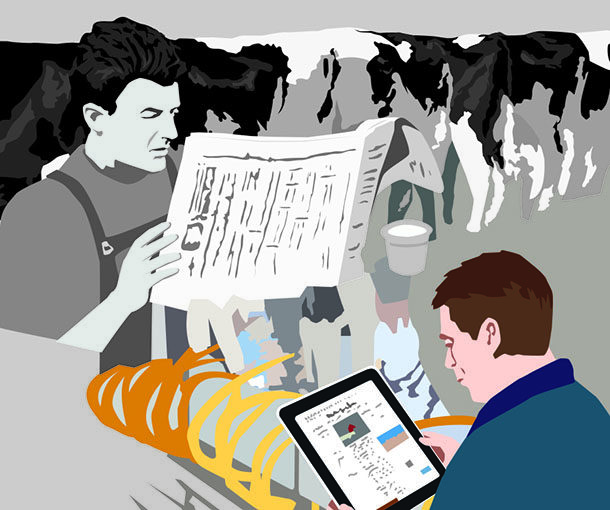In 2011, Pope John Paul II was beatified, Fidel Castro resigned, and Charlie Sheen was fired from Two and a Half Men. More importantly, The Milk House first appeared in Progressive Dairy.
When I was young, I noticed that there weren’t many novels about farmers anymore, and those that could be found were few and far-between. That didn’t seem to do justice to an occupation and lifestyle that requires such moxie and selfhood. I became interested in writing in order to fill that gap and tell the story of people like my family. The experience of one person in agriculture is never exactly the same as another, and the act of farming itself is always changing. Still, I believe it is important to characterize the courage it takes to farm, regardless of who that farmer is and where they’re doing it.
In addition to publishing a literary novel that explores the dynamics of modern dairy farming, my other goal was to be able to write for farmers directly in the form of a column. I envisioned something that dug a little deeper into what it means to be a farmer, whether with humor or lament, and sometimes put it into an international context. It was the type of column generally not found in agricultural journals – and because of that, it would take an open-minded and forward-thinking publication to give it a chance.
The magazine business is a tough one. Those involved are on a tight budget and strapped for time. Once I entered the fray of writing for periodicals, it soon became apparent that, in most cases, editors don’t want to take risks. Even more disheartening, once they deem that you don’t have something they need, they are unlikely to bother answering your emails. However, Walt Cooley, the editor of Progressive Dairy, was different. Not only did he find space for The Milk House when others wouldn’t, he has been generous and supportive in the writer-editor liaison since the first column. I’ve now been around long enough to appreciate how rare that is and to understand it as a sign of how much he respects the contributors to Progressive Dairy, the magazine itself and the industry it serves. Without the patience and hard work of Walt, the publisher Alan Leavitt, and all the staff, The Milk House wouldn’t have made it off the ground, much less to 10 years.
Naturally, the next thank you goes to the readers. Without those willing to sit down with The Milk House for a few minutes, there couldn’t be anything worth writing. The number of people who have reached out through the years is humbling. That alone has made it worth it. The opportunity to write this column has also meant having a place to attempt to articulate ideas on some aspects of farming or rural life and a chance to explore it with the readers. Many of the thoughts poked at here became the start of larger projects that end up published in various places. Even when readers disagreed with a column – which should happen a few times in the span of 10 years – they nearly always did it with respect. There was never any doubt: The readers of Progressive Dairy are a classy bunch, and I owe much to them.
It has taken longer than I expected, but one of those longer works that, in many ways, had its start in The Milk House has finally come to fruition. This March, my novel, titled The Beasts They Turned Away, will be published by époque press. Although it is set on an Irish dairy farm and uses some of the farming terms unique to the island, I hope the experience of family farming it portrays is recognizable by everyone. Many of the themes it explores will be familiar to Milk House readers.
In The Beasts They Turned Away, Íosac Mulgannon is an aging farmer who is trying to hold onto his sanity as well as his dairy farm. Losing a grip on his mental and physical health, he is burdened with looking after a mute child who may be cursed and who the villagers want to send away. The novel uses allegory as a way to investigate the state of modern agriculture and, to my knowledge, is the only contemporary literary novel that addresses these concerns in farming.
Although “experimental” farm novels are a hard sell in the publishing market, and finding the right publisher was a tough process, it has always been important to me that a novel exists in which modern farming is accurately presented in contemporary literature. Few people write fiction about farmers anymore, and when a farm does appear in the background of a book, it is too often with pastoral and idyllic shades that farmers themselves know isn’t an accurate portrayal of the occupation. Farming is more than being close to nature and being surrounded by nice landscape. Instead, it is gritty and takes grit by those who do it. I hope The Beasts They Turned Away does that justice.
My very first writing teacher had us sit down and decide our motives behind wanting to write. The first reason – desiring to tell the story of the family farm – I already mentioned. My second was this: Writing, for me, has always been a way to say thank you for those who have helped me in some way. It meant having something to show for the time and support invested in me. I hope the 10 years of The Milk House has done just that for some of those people, even in some abstract way. The readers of Progressive Dairy have had a large part in getting me this far, least of all by giving me someone to write for. However, if abstract appreciation won’t cut it, let me say it directly here: Thanks for 10 great years.
And here’s to the start of another 10.





